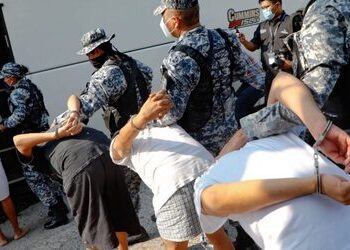Several Latin American countries have recently declared or prolonged states of emergency aimed at combating organized crime, even though the results of these efforts so far have been lackluster.
In the first days of October, the governments of Ecuador, Honduras, and El Salvador extended their existing states of emergency.
In general, this type of measure suspends civil rights such as the inviolability of the home, freedom of movement, and freedom of assembly, among others. At the same time, it calls on the armed forces to support the police in tackling criminality and militarizes law enforcement.
In Ecuador, President Daniel Noboa extended the country’s state of emergency in the framework of the “internal armed conflict” he declared in January a few months after assuming power. This time, he prolonged it for a period of 60 days in neighborhoods spanning eight provinces, including the capital Quito, in addition to declaring a curfew in 20 zones.
SEE ALSO:Honduras Doubles Down on Flawed Mano Dura Strategy
Honduras has been in a state of emergency for over 20 months now, and the president just extended it for the twelfth time for another 45 days. The measure is meant to aid the fight against organized crime, and extortion in particular, according to the first decree published in December 2022.
Finally, in El Salvador, the Legislative Assembly approved the extension of President Nayib Bukele’s emergency regime for an additional 30 days, until November 6. This was the 31st extension and the second since August, when Bukele raised the possibility of dispensing with the measure, which has been in force since 2022.
Other countries in the region have also implemented similar measures. On September 25, Chile’s Senate backed a new extension of the state of emergency in a large swath of the southern part of the country in an effort to prevent violent actions framed as part of the conflict between the government and Indigenous populations.
A few days later, on September 27, Peruvian President Dina Boluarte announced a state of emergency in a district of the port city of Callao and 13 others in the province of Lima. The decision was in response to a growing wave of extortion and homicides targeting transport workers.
A month ago Haiti extended its state of emergency to the whole of its territory during one of the worst humanitarian crises in the nation’s history. Jamaica has also made frequent use of this measure, and has had a state of emergency active since September 13 in the Parish of Clarendon, which is generating concern at the Inter-American Court of Human Rights (IACHR).
In addition to the states of emergency declared in 2024, at least 30 states of emergency were declared in Latin America and the Caribbean between April 2020 and April 2023, according to a June 2023 report by the Center for Strategic and International Studies (CSIS).
InSight Crime Analysis
The frequent use of states of emergency by several Latin American governments brings immediate operational, political, and media benefits, but few promised results. And the measures pose risks when they are prolonged.
At the political level, states of emergency tend to silence the opposition and please citizens, and at the operational level, they provide greater legislative flexibility in the use of the army. But few countries manage to reduce crime rates through the use of these measures, and there are serious concerns about human rights violations.
Far from being a novelty, the apparent success of the Bukele model in El Salvador re-upped the regional popularity of this measure to confront organized crime. Even though the results in curbing homicides and other violent crimes vary from country to country, there are a number of other reasons that seem to encourage its use.
SEE ALSO:The Anatomy of Violence in Durán
Sometimes the measure is perceived as the only option because “governments don’t have a real citizen security policy” and offer this solution to show their authority against their political rivals, Edward Holfman, an academic and security analyst, told InSight Crime.
On the other hand, it allows them to show the population “that they are really taking drastic measures” and reinforces an iron fist approach to a society that “wants to feel safe no matter what,” Holfman said.
Governments can expect “three additional advantages” after declaring a state of emergency, according to CSIS. On the one hand, it helps “lift restrictions on the deployment of military forces in domestic security” – or the militarization of the police – and provides a “means of quickly deploying a large public security presence into an at-risk area, disrupting the day-to-day operations of organized crime”. Finally, as Holfman says, it is sometimes presented as “the only practical tool” for dealing with crime in areas with little state presence.
In addition to the possible setbacks in human rights, the emergence of a “perpetual crisis” is a concern, according to the CSIS report. Ecuador and Haiti have had states of emergency in force since January and March of this year, respectively, while El Salvador, Honduras, and Chile have been implementing such decrees since 2022, with successive uninterrupted extensions. The Inter-American Court of Human Rights “has consistently expressed its concern over the repeated use of the measure” in Jamaica.
The results are also questionable.
While El Salvador managed to subdue gangs and lower the homicide rate from 36 per 100,000 in 2019 to 2.4 in 2023, concerns about human rights violations abound. Chile reported a marked drop in rural violence in the south compared to previous years in the latest extension of the measure, but other countries did not report those kinds of successes.
In Peru, the police have arrested 1,248 people so far during the state of emergency, but the violence has continued. On October 9, an explosive went off in a bus parking lot in the Independencia district. Days before, in Callao, four people were killed by a hitman who pretended to be a passenger.
Honduras’ iron fist approach is deeply flawed, and Ecuador has not managed to improve its security situation, with Durán continuing as an epicenter of crime and violence.
Featured image: Men arrested under El Salvador’s state of emergency are taken to a prison. Credit: El Salvador’s government.
Source link : http://www.bing.com/news/apiclick.aspx?ref=FexRss&aid=&tid=670f062d391647d18eaefe3d98c68c75&url=https%3A%2F%2Finsightcrime.org%2Fnews%2Fwhy-do-latin-american-governments-keep-betting-on-states-of-emergency%2F&c=7136243465008106998&mkt=en-us
Author :
Publish date : 2024-10-14 13:00:00
Copyright for syndicated content belongs to the linked Source.











